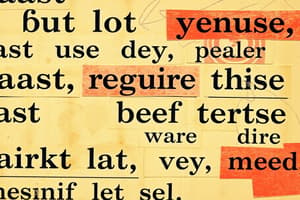Podcast
Questions and Answers
Which sentence correctly uses the present simple tense?
Which sentence correctly uses the present simple tense?
- I have been studying all day.
- He was going to the store yesterday.
- She is playing the piano every evening.
- They play basketball on weekends. (correct)
Which sentence illustrates the use of a modal verb correctly?
Which sentence illustrates the use of a modal verb correctly?
- I can swimming very well.
- He should to leave early today.
- They mays arrive late.
- You must not forget your keys. (correct)
Identify the sentence that uses a preposition of time correctly.
Identify the sentence that uses a preposition of time correctly.
- I will meet you at Monday.
- She goes to school on weekdays. (correct)
- He arrived during the morning.
- The concert starts in 5 PM.
Which sentence correctly uses an adverb of frequency?
Which sentence correctly uses an adverb of frequency?
Which sentence correctly uses 'there is/there are'?
Which sentence correctly uses 'there is/there are'?
Flashcards are hidden until you start studying
Study Notes
Present Simple Tense
- Used for routines, facts, and general truths.
- Structure: Subject + base verb (+s/es for third-person singular).
- Examples: "She writes," "They play."
Present Progressive Tense
- Used for ongoing actions and situations happening at the moment.
- Structure: Subject + am/is/are + verb-ing.
- Examples: "I am studying," "He is running."
Prepositions of Time
- Indicate when something happens.
- Common prepositions: at, on, in.
- Examples: "I have a meeting at 3 PM," "Her birthday is on April 5th."
Prepositions of Place & Movement
- Describe location and direction.
- Place: at, in, on (e.g., "The book is on the table.")
- Movement: to, from, into (e.g., "She went to the market.")
Modal Verbs (must, have to, should)
- Must: indicates necessity or obligation (e.g., "You must finish your homework.")
- Have to: expresses external necessity (e.g., "I have to go to work.")
- Should: suggests advisability (e.g., "You should see a doctor.")
Adjectives
- Describe nouns and answer questions like "What kind?" or "How many?"
- Examples include: beautiful, tall, interesting.
Adverbs
- Modify verbs, adjectives, or other adverbs.
- Adverbs of manner: describe how an action is performed (e.g., "She sings beautifully.")
- Adverbs of frequency: indicate how often (e.g., "He usually goes jogging.")
Personal Pronouns & Possessives
- Personal pronouns: replace nouns (e.g., I, you, he, she, it, we, they).
- Possessive pronouns indicate ownership (e.g., mine, yours, his, hers).
State Verbs
- Describe states rather than actions (e.g., know, believe, love).
- Typically not used in continuous forms.
There is / There are
- Used to indicate existence.
- "There is" for singular nouns (e.g., "There is a cat.")
- "There are" for plural nouns (e.g., "There are three dogs.")
Have Got / Has Got
- Indicate possession.
- "Have got" is used with I, you, we, they; "has got" with he, she, it.
- Examples: "I have got a new car," "She has got a brother."
Active/Passive Voice
- Active: subject performs the action (e.g., "The chef cooks the meal.")
- Passive: subject receives the action (e.g., "The meal is cooked by the chef.")
Countable and Uncountable Nouns
- Countable nouns: can be counted (e.g., apples, books).
- Uncountable nouns: cannot be counted and often do not have a plural form (e.g., water, rice).
Quantifiers
- Indicate quantity without specifying an exact number (e.g., some, many, few, a lot of).
- Used with both countable and uncountable nouns.
Was/Were
- Past tense forms of "to be."
- "Was" for singular subjects (I, he, she, it), "were" for plural subjects (you, we, they).
- Example: "I was happy," "They were excited."
Past Simple
- Used for completed actions in the past.
- Structure: Subject + past form of the verb.
- Examples: "I walked," "She saw."
Numbers
- Express quantities, order, and measurements.
- Include cardinal numbers (one, two, three) and ordinal numbers (first, second, third).
Studying That Suits You
Use AI to generate personalized quizzes and flashcards to suit your learning preferences.




